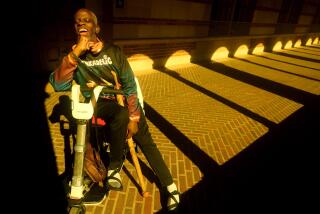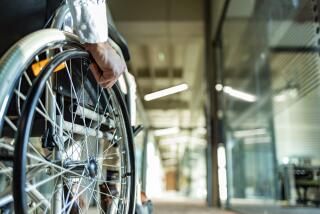A Legal Precedent for Paraplegic : Education: Julie Alban, paralyzed after a 1988 shooting, is about to get her law school degree and will establish a scholarship for others in wheelchairs.
- Share via
DANA POINT — There have been moments of despair during the past five years when Julie Alban didn’t think she’d make it.
Sitting in a wheelchair with a bullet in her spine, in constant and almost unbearable pain, she sometimes succumbed to a deep depression; her plans to become a lawyer seemed like a faint and impossible dream.
“There were many times I felt like giving up,” Alban said during a recent interview on the patio of her Dana Point home. “Times when I felt totally overwhelmed by my situation.”
The young woman didn’t give up, however, and the payoff comes Sunday. In a ceremony at UCI’s Bren Center, Alban, 27, will graduate from Western State University College of Law in Fullerton. At the same time, she will present a check for $10,000 to establish what may be the country’s first ongoing scholarship for law students in wheelchairs.
Once more at home on a tennis court than in a court of law, the daughter of a prominent Long Beach surgeon now plans to use her experience and her law degree to help other disabled people.
“I know so many people in wheelchairs who would like to do something but don’t have the confidence,” Alban said. “Hopefully this will encourage them. The law needs more disabled people practicing it; you can’t expect to change society if you’re not in it.”
Alban’s own jarring passage to life as a paraplegic occurred on June 8, 1988, when her then-boyfriend, Bradley Ackerman, entered her bedroom at 7 a.m., shot her in the back while she was sleeping, then turned the gun on himself. Alban was left paralyzed from the waist down; Ackerman sustained chest injuries from which he recovered.
The night before the attack, Alban said, she had rejected Ackerman’s proposal of marriage. During the ensuing trial, Ackerman, then 24 and a former national junior tennis champion, testified that, disappointed by his failure to become a professional player and depressed over huge gambling debts, he had taken Valium, blacked out and shot the woman he loved. After recovering from his wounds, he was convicted of attempted second-degree murder and sentenced to life imprisonment with parole eligibility in 1996.
Because of the prominence of both families, the case made national headlines. Alban is the daughter of Dr. Seymour Alban, who has run for state and national office, while Ackerman is the stepson of Daniel H. Ridder, former publisher of the Long Beach Press-Telegram. Residents of one of the city’s most exclusive neighborhoods, the two families lived across the street from each other and had even traveled to Israel together.
For Julie Alban, though, the real trial began after the television lights dimmed.
“The first year was really tough,” said the young woman, who spent seven weeks in the hospital and underwent physical therapy for a year. “When I was lying in that hospital bed I thought my life was over, that I would never be happy again. It took me a long time to accept the reality (of permanent disability); to say to myself: ‘This is your life.’ ”
Among those whom she credits with helping her achieve emotional recovery, Alban said, are family members who kept telling her that, though life in a wheelchair would be different, it needn’t be worse.
“It really helped to read articles about disabled people who had done good things,” she recalled.
To help maintain her spirits during this period, Alban personally orchestrated a campaign that raised $25,000 in award money for disabled marathon runners. She also flew to the Bahamas to appear in a videotape promoting scuba diving for the disabled. And, pursuing an old dream, she began attending classes at the Fullerton campus of Western State University College of Law. Her goal was to become a legal advocate for people with disabilities.
“There are so many changes to be made,” Alban said. “Disabled people need to be their own advocates. No one can speak for disabled people as well as one who has a disability.”
While law school was difficult, Alban said, it obviously was not impossible. Facilities were relatively accessible and professors kind. Fellow students, she said, were generally supportive.
Yet Alban is one of the few students ever to attend the college in a wheelchair, according to administrators. While the practice of law is particularly well-suited to the abilities of many people in wheelchairs, they say, disabled people are often discouraged from attending law school because of financial considerations.
“People with physical handicaps don’t find it easy to go to law school,” university President John Monks said. “They’ve found the additional costs (of transportation and equipment) prohibitive.”
College officials hope that the newly established Alban Scholarship Fund will help to change that. By carefully investing the $10,000 contributed by the Alban family--which they hope will soon be joined by other donations--the university expects to generate enough interest income to offer annual scholarships to wheelchair-bound students, Monks said. And to show its commitment, he said, the university will match whatever scholarship money is given from the Alban fund.
“The Bar needs to be open to all kinds of people,” Monks said. “We need lawyers out there whose clients, in many cases, will be people with disadvantages.”
A spokeswoman for the American Bar Assn. said she was not aware of any other scholarships in the country designated specifically for law students who use wheelchairs.
Alban, meanwhile, spends most of her time these days studying for the State Bar exam, which she expects to take in July. She has already received job offers from three Orange County law firms, she said, but there is one more thing--inspired by her trip to the Bahamas--that she’d like to do before accepting any of them.
“I want to go scuba diving,” Alban said, staring out at the beach behind her house. “It’s one of the few ways in which disabled people can really get out of their wheelchairs.”
More to Read
Sign up for Essential California
The most important California stories and recommendations in your inbox every morning.
You may occasionally receive promotional content from the Los Angeles Times.










